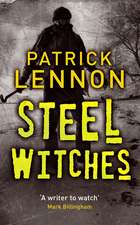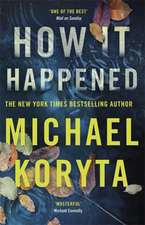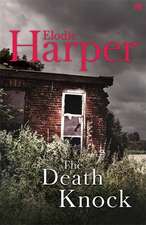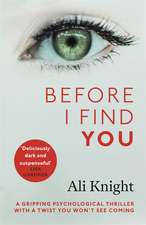The Secret in Their Eyes
Autor Eduardo Sacherien Limba Engleză Paperback – 24 feb 2016
| Toate formatele și edițiile | Preț | Express |
|---|---|---|
| Paperback (2) | 54.00 lei 3-5 săpt. | +27.92 lei 10-14 zile |
| John Murray Press – 24 feb 2016 | 54.00 lei 3-5 săpt. | +27.92 lei 10-14 zile |
| Other Press (NY) – 17 oct 2011 | 119.30 lei 3-5 săpt. |
Preț: 54.00 lei
Preț vechi: 70.30 lei
-23% Nou
Puncte Express: 81
Preț estimativ în valută:
10.33€ • 10.82$ • 8.55£
10.33€ • 10.82$ • 8.55£
Carte disponibilă
Livrare economică 15-29 martie
Livrare express 04-08 martie pentru 37.91 lei
Preluare comenzi: 021 569.72.76
Specificații
ISBN-13: 9781473632400
ISBN-10: 1473632404
Pagini: 400
Dimensiuni: 130 x 198 x 28 mm
Greutate: 0.28 kg
Editura: John Murray Press
ISBN-10: 1473632404
Pagini: 400
Dimensiuni: 130 x 198 x 28 mm
Greutate: 0.28 kg
Editura: John Murray Press
Notă biografică
Eduardo Sacheri was born in Buenos Aires in 1967. His first collection of short stories, Esperándolo a Tito y otros cuentos de fútbol (Waiting for Tito and Other Soccer Stories) was published in Spain in 2000 under the title Traidores y otros cuentos (Traitors and Other Stories). Three other collections were published between 2001 and 2007, all of which have been best sellers in Argentina. His novel La pregunta de sus ojos has been sold into eight territories, and the film adaptation, The Secret inTheir Eyes, won the Academy Award for Best Foreign Film in 2010.
John Cullen is the translator of many books from Spanish, French, German, and Italian, including Margaret Mazzantini’s Don’t Move, Yasmina Khadra’s Middle East Trilogy (The Swallows of Kabul, The Attack, The Sirens of Baghdad), Christa Wolf’s Medea, and Manuel de Lope’s The Wrong Blood (Other Press). He lives in upstate New York.
John Cullen is the translator of many books from Spanish, French, German, and Italian, including Margaret Mazzantini’s Don’t Move, Yasmina Khadra’s Middle East Trilogy (The Swallows of Kabul, The Attack, The Sirens of Baghdad), Christa Wolf’s Medea, and Manuel de Lope’s The Wrong Blood (Other Press). He lives in upstate New York.
Extras
I’m not sure about my reasons for recounting the story of Ricardo Morales after so many years. I can say that what happened to him has always aroused an obscure fascination in me, as if the man’s fate, a life destroyed by tragedy and grief, provided me with a chance to reflect on my own worst fears. I’ve often caught myself feeling a certain guilty joy at the disasters of others, as if the fact that horrible things happened to other people meant that my own life would be exempt from such tragedies, as if I’d get a kind of safe-conduct based on some obtuse law of probability: If such and such a catastrophe befalls Joe Blow, then it’s unlikely that it will also strike Joe’s acquaintances, among whom I count myself. It’s not as though I can boast of a life filled with success, but when I compare my misfortunes with what Morales suffered, I come out well ahead. In any case, it’s not my story I want to tell, it’s Morales’s story, or Isidoro Gómez’s, which is the same story but seen from the other side, or seen upside down, or something like that.
Although the morbid interest my subject arouses in me isn’t the only reason why I’m writing these pages, it carries some weight and plays some part. But mostly, I suppose, I’m telling the story because I have time to tell it. A lot of time, too much time, so much time that the daily trifles whose sum is my life quickly dissolve into the monotonous nothingness that surrounds me. Being retired is worse than I’d imagined. I should have known it would be. Not because of anything I knew about retirement, but because things we fear generally turn out
worse when they happen than when we imagined them.
Although the morbid interest my subject arouses in me isn’t the only reason why I’m writing these pages, it carries some weight and plays some part. But mostly, I suppose, I’m telling the story because I have time to tell it. A lot of time, too much time, so much time that the daily trifles whose sum is my life quickly dissolve into the monotonous nothingness that surrounds me. Being retired is worse than I’d imagined. I should have known it would be. Not because of anything I knew about retirement, but because things we fear generally turn out
worse when they happen than when we imagined them.
Recenzii
“Beguiling… [A] complex and engaging narrative.” —Publishers Weekly
“A brutal murder is the starting point for this strange, compelling journey through Argentina’s criminal-justice system… A view of the world as a dark place illuminated by personal loyalties.” —Kirkus Reviews
“Intriguing and often riveting…This book is primarily a murder mystery, but the focus on 1970s Argentina and the internal angst of the protagonist add layers of complexity. Highly recommended for readers with an interest in suspense, history, and the human psyche.” —Library Journal
“In straightforward prose, Sacheri builds a startling psychological mystery—about the secrets of a country corroded by state terror, and the secrets of a heart so suffocated that it cannot utter its simple, pure desire.” —Michael Greenberg, author of Beg, Borrow, Steal and Hurry Down Sunshine
“A brutal murder is the starting point for this strange, compelling journey through Argentina’s criminal-justice system… A view of the world as a dark place illuminated by personal loyalties.” —Kirkus Reviews
“Intriguing and often riveting…This book is primarily a murder mystery, but the focus on 1970s Argentina and the internal angst of the protagonist add layers of complexity. Highly recommended for readers with an interest in suspense, history, and the human psyche.” —Library Journal
“In straightforward prose, Sacheri builds a startling psychological mystery—about the secrets of a country corroded by state terror, and the secrets of a heart so suffocated that it cannot utter its simple, pure desire.” —Michael Greenberg, author of Beg, Borrow, Steal and Hurry Down Sunshine









